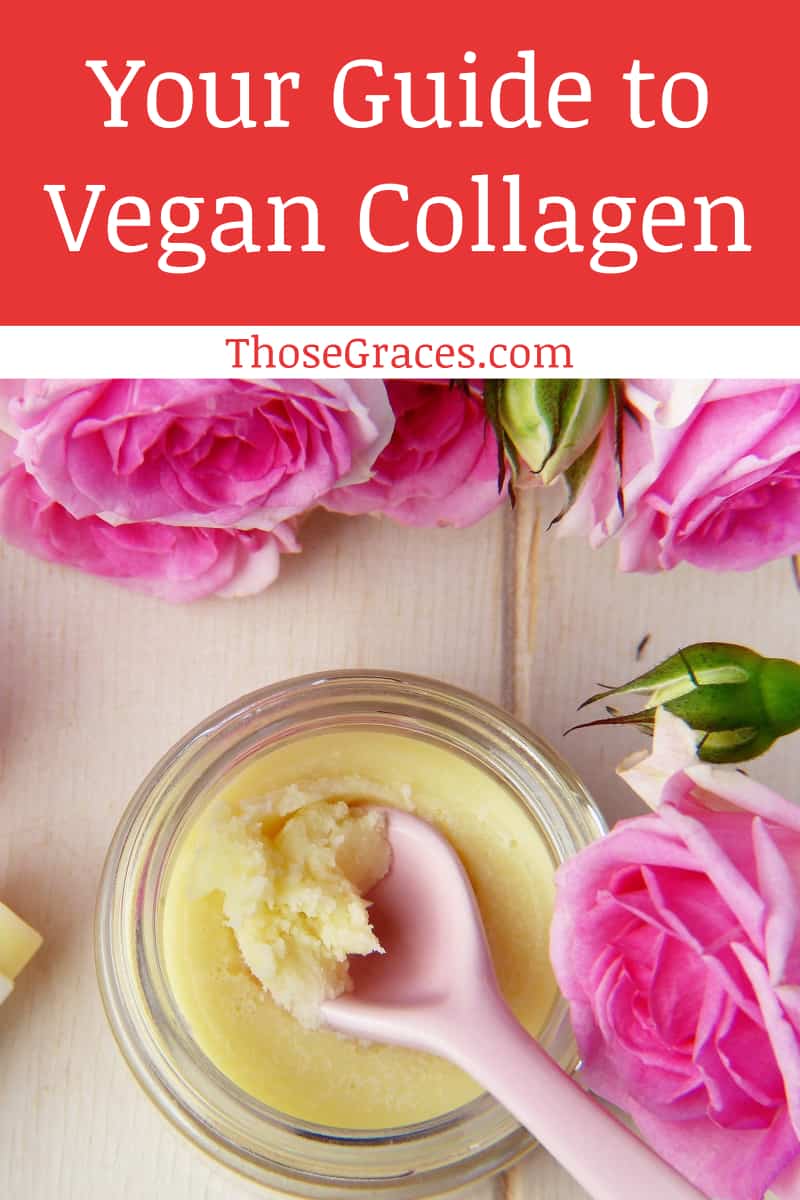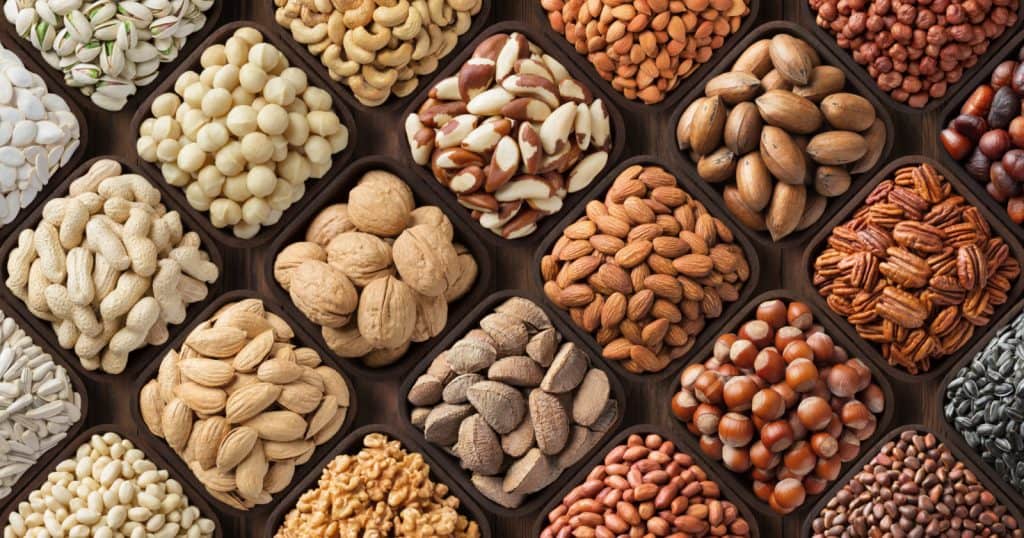Wondering if there’s such a thing as vegan collagen?
Is it as good as animal collagen?
How can you increase it naturally through your diet?
Grab a cup of herbal tea and get ready to learn the answers of all those questions and more!

What’s the deal with collagen, anyway?
Spend five seconds browsing the health trends on Pinterest, and you’ll come across thousands of different posts on the benefits of collagen.
It’s all the rage right now, but is it a trend that’s even worth checking out? Turns out, it just might be.
Before I even think about jumping on a health bandwagon, I see what science has to say over on Science Daily (it gathers up all the studies in one super convenient spot).
A few highlights regarding the benefits of collagen include:
- Improved gum health.
- Faster wound healing
- Help for damaged hearts
- Helps prevent bone loss.
- Even helps with stress incontinence!
Other natural health aficionados and experts claim it also helps keep your skin and hair looking healthier, relieves anxiety, and more.
Sounds great, right? Ready to go buy a bottle and give it a try? Hold your horses, there, my vegan (and even my vegetarian) pals! Most collagen on the market comes from animal sources.
Even worse, it comes from the cartilage of those animals, after they’ve been slaughtered.
For those who have an ethical reason to avoid animal products, typical collagen- like the creatures that it comes from- is off the menu.
Don’t look so glum. You’re not completely out of the loop when it comes to experiencing the benefits of this health trend. See, there actually is vegan collagen! Well, sort of.
Let’s learn more about it and see if it’s a good option for you.
Now is a good time to mention that this post contains affiliate links. If you make a purchase through these links, we earn a small commission at no extra charge to you.
Complete Guide to Vegan Collagen
Given the gruesome origins of regular collagen, it makes sense that science would find a way to create a vegan version for the increasing number of people that abstain from animal products.
The key phrase- and one that may be a bit of a turnoff for naturalists- is “science would find a way.”
See, collagen in the strictest sense doesn’t come in a vegan form. Like I said above, it’s found in the cartilage. Plants don’t exactly have bones, ergo no cartilage.
So, no, you won’t find a magical vegan collagen source just chilling in a forest waiting for you to come along and pick it.
Scientists did find a way to grow it using yeast and bacteria combined with human genes.
It sounds a lot freakier than it is, but I know a lot of people aren’t really fond of genetically modified foods or supplements.
Bottom line, though, if you want to use a collagen supplement without harming animals, you’ll have to accept something created in a laboratory.
What about seaweed collagen?
As someone with very specific ethics regarding eating animals, I was super excited to learn that “seaweed collagen” existed.
“Great,” I thought. “I can get it that way without hurting animals.”
Unfortunately, I didn’t read the small print. See, which this form of collagen doesn’t involve animals slaughtered in a factory, it does have animal-based collagen in it.
In this case, it comes from fish who die natural deaths in the ocean. The collagen settles into the seaweed.
Now, this could still be a good alternative for some, as the process occurs naturally and with no human intervention.
However, if you’ve sworn off all animal products and by-products regardless as to how they came to exist, seaweed or “marine kelp” collagen isn’t for you.
You’re back to science-based vegan alternatives.
Vegan collagen vs animal collagen
Is vegan collagen as good as animal collagen? In terms of health benefits, the jury is still out.
Remember, vegan collagen is still relatively new, so there aren’t a ton of long-term studies.
However, in other respects, it may actually be even better than the “real” deal.
As Healthline points out, vegan collagen has some advantages to consider.
For one thing, it has a lower risk of causing allergies, since it’s not derived from animal sources.
Also, vegan collagen grown in a laboratory setting may actually be safer than the stuff harvested from hormone and chemical-riddled animal bones.
Plus, in the future, vegan collagen may even cost less than the regular stuff, since yeast is super duper easy to grow.
What if you decide that you’re just not comfortable taking something created in a lab? Don’t worry, you’re not out of the collagen game just yet!
How to  get collagen from vegetarian diet
Right now, even if you did decide you’re comfortable taken something grown in a lab, vegan collagen isn’t exactly easy to come by.
In fact, I only found one legit brand that I’d recommend, and it’s not cheap. It’s made by Algenist.
No products found.
Sure, at first glance it looks like Amazon is loaded with options, but read closer and you’ll see that most are collagen builders, not actually collagen supplements.
That’s not entirely bad, though. Remember, collagen comes from the cartilage of animals, and we humans happen to be animals, too.
So, let’s talk about how to build our own collagen, either naturally or with the help of those aforementioned builders.
How can vegans increase collagen?
It’s actually fairly easy to increase your collagen without resorting to supplements. It’s also super tasty, too! Some of the best foods include:
- Oranges and other citrus fruits– naturally boost collagen and have antioxidants to fight free radicals.
- Soybeans-Â just go easy on it, as too much soy can royally mess with your estrogen and even impact your fertility.
- Black beans- also, kidney beans, and pretty much all types of beans.
- Seeds- especially pumpkin, sunflower or chia seeds
- Nuts– especially cashews, peanuts and pistachio nuts.
- Leafy greens-Â particularly bitter veggies, like kale and spinach.
Orange foods rich in beta-carotene (which becomes Vitamin A) are great, too, because they help slow down the loss of the collagen that you do have already.
Of course, if you don’t feel like your diet is balanced enough to help increase collagen, you can always try a supplement. Garden of Life makes one that customers rave about.
No products found.
Bottom line, yes, vegan collagen exists and yes, it’s as good as the animal-based kind but it comes with caveats. It’s hard to find, expensive (for now), and made in a lab.
So, boosting your own natural supply may be your best bet for now.




